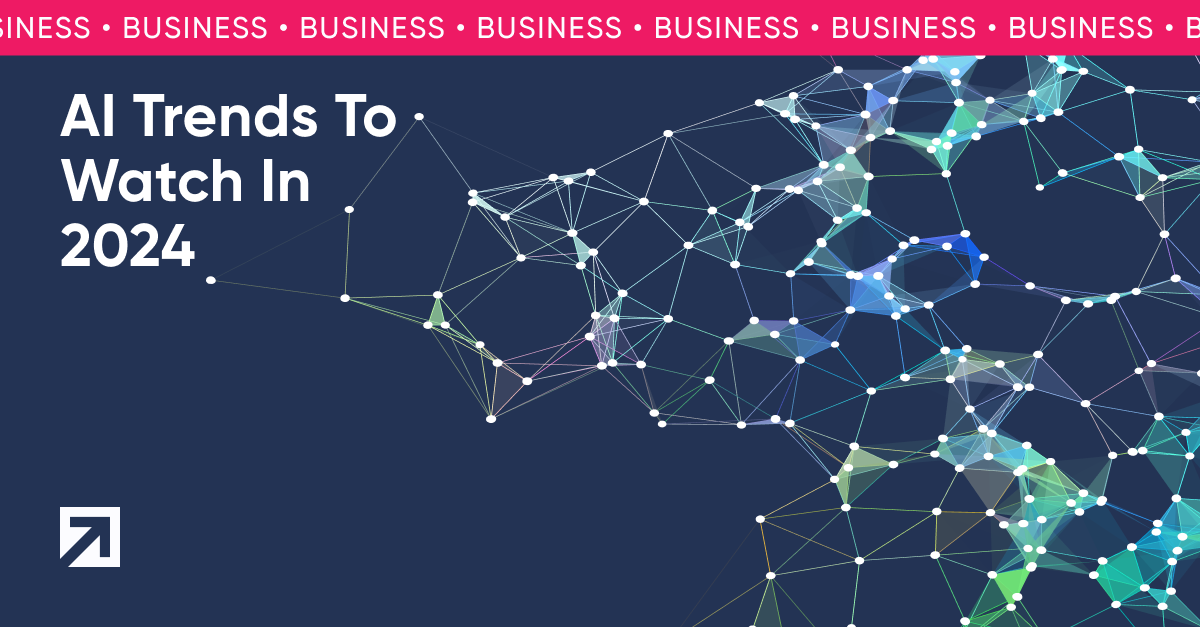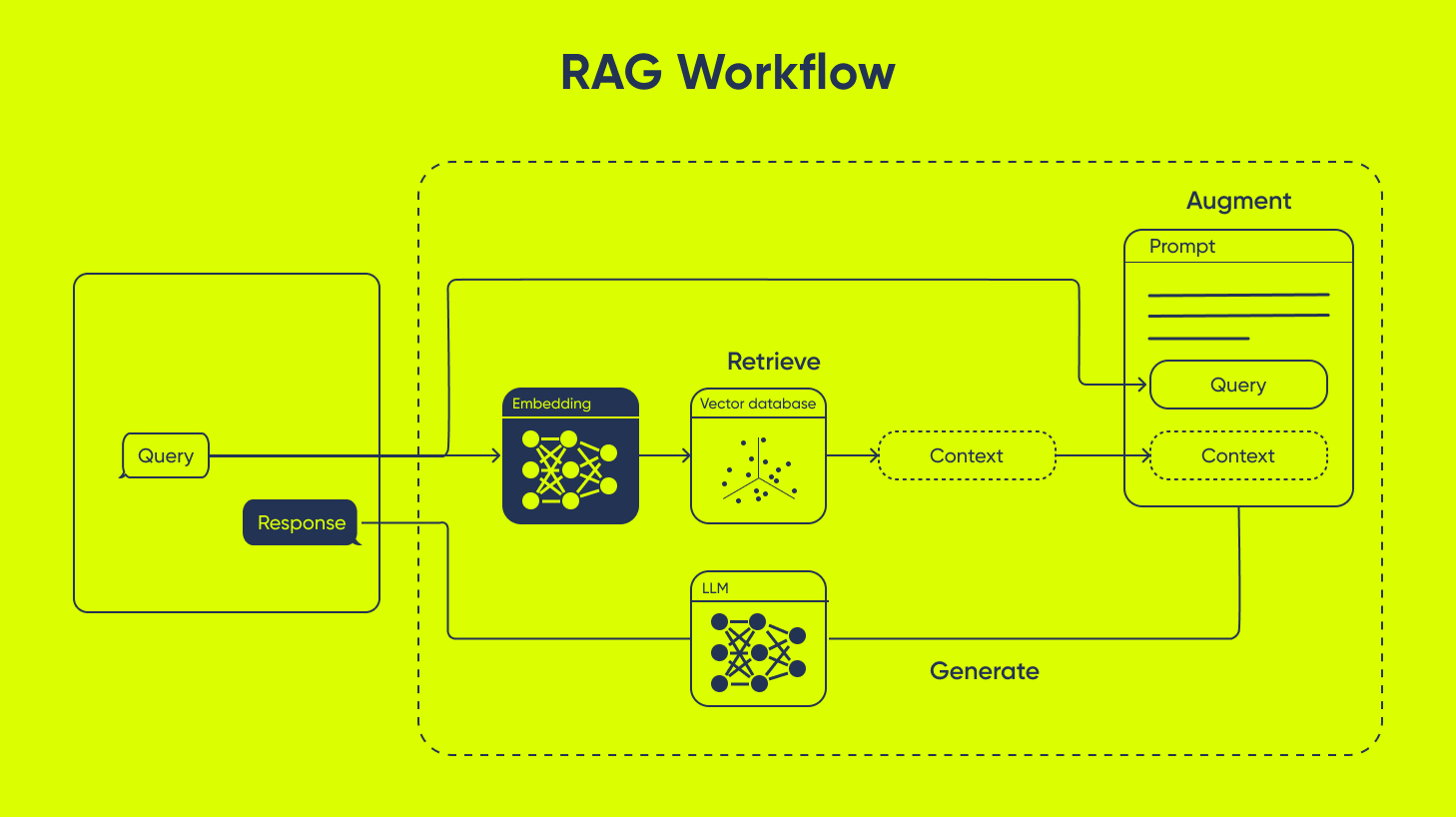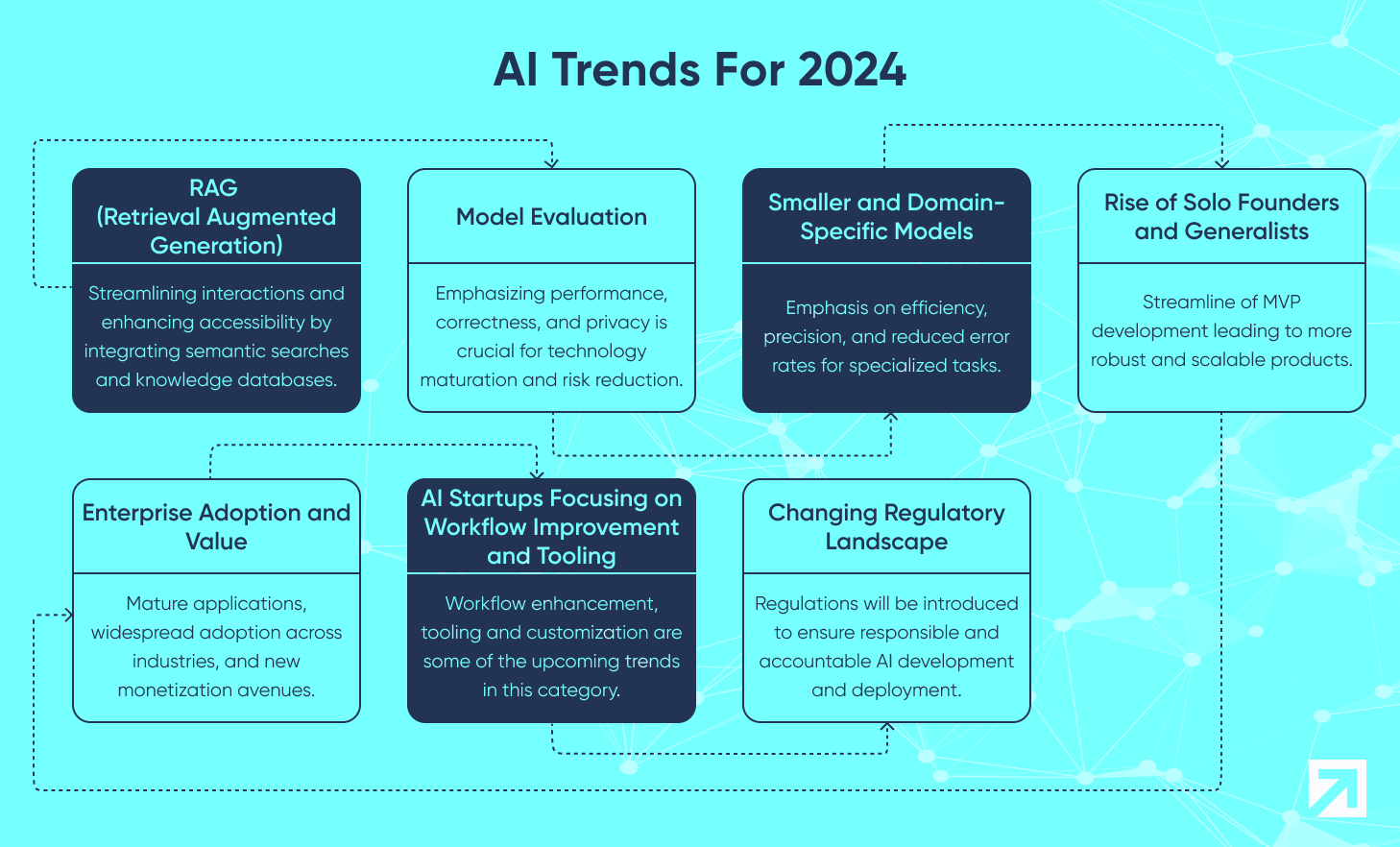

Artificial Intelligence (AI) has been at the forefront of technological advancements in recent years, and as we move into 2024, we’re seeing several emerging trends set to reshape the AI landscape. In this blog post, we'll explore some of the most significant trends to watch out for in the world of AI.
1. RAG (Retrieval Augmented Generation): Simplifying AI Interaction
AI models have come a long way in their ability to process and generate human-like text. A trend that's gaining momentum is Retrieval Augmented Generation (RAG). This approach involves providing relevant information to a GenAI model, typically obtained through semantic searches on documents or querying databases.
RAG simplifies interactions with AI models and makes them more versatile and cost-effective in engineering efforts. This trend is already on the rise and is expected to become more accessible to users.
Examples have shown that RAG is a straightforward entry point to AI. By creating knowledge databases from a series of documents, users can query the system for information, making AI more approachable.

2. Model Evaluation: Ensuring Performance, Correctness, and Privacy
Building a prototype of an AI model is often the easy part. Taking it into production, however, involves numerous complexities and challenges. Model evaluation is the crux of ensuring an AI system's performance, correctness, and privacy, and it's the most expensive and complex aspect of deploying AI systems.
In 2024, we can expect more focus on use cases where proof of concepts (PoC) is straightforward, but taking the AI into production is a more complex endeavor. This trend is essential for maturing AI technology and reducing risks in various use cases.
Model Evaluation will have to focus on:
- Performance: Evaluating AI model performance involves measuring metrics like accuracy, precision, recall, and F1 score. Continuous monitoring and adjustment are critical for maintaining optimal performance.
- Correctness: Beyond accuracy, correctness ensures that AI models produce contextually relevant results and make sense within the task. This is especially challenging in natural language understanding tasks.
- Privacy: Privacy is a growing concern, and AI systems must adhere to data protection regulations. Techniques like federated learning protect privacy by training models on decentralized data sources.
3. Smaller and Domain-Specific Models: Beyond GPTs
While large and versatile models like GPT-3 have garnered attention, 2024 sees a move towards smaller, domain-specific models. These models offer numerous advantages:
- Efficiency: Smaller models require less computational power, reducing operational costs and making AI more accessible to various applications and devices.
- Precision: Domain-specific models excel in specialized tasks, achieving higher precision within their specific domains. They can outperform larger, general models in these areas.
- Reduced Error Rates: Smaller models tend to make fewer errors in their specialized domains because they are fine-tuned for specific tasks. However, this approach requires a more tailored development process.
4. Rise of Solo Founders and Generalists
In 2024, we'll witness a surge in solo founders or "one-person orchestras" who can independently create AI-based products. Unlike in the past, where product development required a team covering design, marketing, and more, generalists can bring their ideas to life solo or with a very concise team.
This trend is the evolution of a previous trend where founders came up with their ideas, and teams like ours executed them. Then came the era of no-code platforms, and the challenge became the intention to scale or rebuild based on initial testing.
Now, with resources like ChatGPT, it’s become easier to create a Minimum Viable Product (MVP) quickly. While scaling might still be challenging (and usually means starting over and developing the product again with more fit technology), having a proven concept can lead to developing a more robust and scalable product.
5. Enterprise Adoption and Value
In 2024, early adopters of AI will begin bringing their innovations to the market, marking the realization of enterprise value in AI technology. This trend can be further dissected into key points:
- Maturing AI Applications: AI applications continually evolve to address real-world challenges, making them attractive to businesses and organizations looking for innovative solutions.
- Widespread Adoption: Enterprises across various industries will incorporate AI into their operations, from customer service to data analysis, process optimization, and more.
- Monetization: AI-based products and services will find new ways to generate revenue, offering value to both customers and the businesses that deploy these solutions.
6. AI Startups Focusing on Workflow Improvement and Tooling
Another trend for 2024 is the emergence of startups dedicated to enhancing AI workflows and providing specialized tools for AI development. This trend includes the following aspects:
- Workflow Enhancement: Startups focus on improving the efficiency and effectiveness of AI workflows, providing tools for data preparation, model training, evaluation, and deployment, thus streamlining the AI development process.
- Tooling: These startups develop specialized AI tools that cater to the specific needs of developers, data scientists, and AI practitioners. These tools make working with AI technologies more accessible and reduce the barriers to entry for businesses looking to leverage AI.
- Customization: Some startups offer customizable solutions that can be adapted to different industries and use cases, allowing businesses to tailor AI technology to their specific needs.
7. Changing Regulatory Landscape
Lastly, the regulatory landscape for AI is expected to undergo significant changes. Governments and regulatory bodies are increasingly concerned about AI's ethical and legal implications. New regulations will likely be introduced to ensure responsible and accountable AI development and deployment.

Conclusion
In conclusion, 2024 will be an exciting year for AI, with trends that promise to make AI more accessible, precise, and reliable. As technology continues to evolve, businesses and individuals must stay informed and adapt to leverage the full potential of AI in their respective fields.
At Xmartlabs, we offer ongoing guidance and assistance throughout this journey. You can rely on our experts to support your endeavors. Contact us to start working with our team of AI experts.
💡 Learn the intricacies of AI and how to manage sensitive data responsibly to ensure safe AI innovation from leading experts!
Register now to secure your spot! ✅



